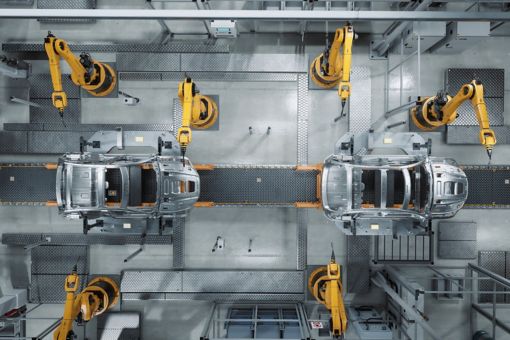Preview
New research from KPMG International suggests that industrial manufacturing is the most mature sector on technology adoption and commercialization.
From the value proposition they offer customers to their operating models, industrial manufacturers are using digital transformation to change the very nature of their businesses. New research from KPMG International suggests that industrial manufacturers lead the way in harnessing technology to drive their strategic ambitions, with many organizations already leaping ahead as a result of their investment in tech innovation.
The KPMG global tech report 2023 surveyed 2,100 executives in 16 countries and nine different industries. Industrial manufacturing respondents were the most likely to have attained ‘digital leader’ status. The study defines digital leaders as those that have already managed to generate profit from their technology investments and have tech stacks in place that they believe will deliver their transformation goals in the future. More than one-third of the 327 digital leaders in the research (36 percent) originate in the industrial manufacturing sector.
Digital maturity drives new business models
“Many traditional industrial manufacturers are becoming technology companies,” says Vinodkumar Ramachandran, Global Leader for Industry 4.0 at KPMG. “They have laid the foundations of digital technologies and now they are focusing on business transformation — new ways to differentiate themselves and new sources of revenue generation.”
The growing move to product-as-a-service (PaaS) business models is one example, adds Ramachandran. Increasingly, industrial manufacturers focus on the lifetime value of customers, using technologies such as the internet of things and data analytics to provide pay-as-you-use contracts or long-term service contracts with performance service level agreements, rather than making one-off product sales. This enables customers to focus on their core business. Pivoting from a product sales focus to a PaaS approach requires a completely different business model and digital architecture.
Another example is the rise of ‘distributed manufacturing.’ Here, centrally located digital cockpits can control highly automated facilities based in locations close to customers. Products can be tailored to the needs of the regional cluster, while local supply chains support resilience and reduce logistical complexity, upholding standards of quality.
The outstanding digital transformation groundwork in the sector to date means that industrial manufacturers are significantly more confident than peers in other sectors in the capacity of their current technology to deliver on strategic priorities. For example, 88 percent of industrial manufacturing respondents are confident their technology can improve efficiency and reduce costs; only 75 percent of all sectors measured say the same. Similarly, 84 percent of the industrial manufacturing executives surveyed are confident in the potential of their organization’s technology to help it build trust with third parties, against an average of 74 percent across all sectors surveyed.
Harnessing artificial intelligence
For many organizations in this sector, artificial intelligence (AI) and machine learning (ML) represent the next technological frontier. Two-thirds of industrial manufacturing respondents (66 percent) expect AI/ML to be the technologies that play the most important roles in helping them achieve their short-term ambitions (against an average of 57 percent across all sectors surveyed).
“AI has become a base technology that industrial manufacturers apply at every stage of the value chain,” says Ramachandran. From initial product design to sales and distribution, organizations see opportunities to apply AI tools to filter and analyze their growing volumes of data to enhance results — and at speed.
This is not to suggest that getting the best out of AI is straightforward. One significant problem is access to talent: most industries report problems with securing access to expertise in data science and AI.
Another concern is governance. Industrial manufacturers are determined to build robust AI systems with strong controls: 61 percent of respondents from the sector say progress on automation is being delayed because of concerns about how AI systems make decisions (compared with an average of 55 percent across all sectors surveyed).


Identifying potential sources of bias is vital because, once bias is introduced into the system, it will keep replicating. These systems also need to be periodically updated and checked; your data must be consistently accurate.

Vinodkumar Ramachandran
Partner and Head - Business Consulting, Head – Industrial Manufacturing & Automotive Sector, Global Head - Industry 4.0, KPMG in India
Doing well by doing good
The potential of digital transformation to drive better performance on environmental, social and governance (ESG) issues is another area where industrial manufacturing stands out
More than half of respondents in the sector (52 percent) say customer expectations around ESG transparency have the most influence on the strategic priorities of digital transformation (compared with an average of 42 percent across all sectors surveyed). And for 57 percent of industrial manufacturing respondents, advancing ESG priorities and commitments, including carbon emissions targets, will be a top innovation goal for their organization’s technology functions over the next two years; only an average of 48 percent across all sectors surveyed agree.
Technology is significant here, because the ESG challenges in the sector are especially pronounced. The raw materials used by industrial manufacturers can leave a significant environmental footprint, for example. Concerns about working conditions, particularly in the supply chain, are front of mind.
In areas such as steel production, advanced manufacturers are also looking at how technology can help them operate with far lower carbon emissions. The challenge of accurately monitoring and reporting ESG performance provides further impetus to adopt technology.
“Industrial manufacturers are focused on data for reporting transparency as well as investing in AI and digital technologies to optimize production and emissions standards,” adds Ramachandran.
Sharpening the competitive edge
In a capital-intensive sector, new technology promises to speed up operations, efficiency and innovation, securing competitive advantage. The development of core engineers with digital and analytical skillsets (bringing analytics to the shop floor) and the ever-increasing flow of data generated by their machinery put this prize within the reach of manufacturers. It is those that plan most effectively — and hold their nerve — that will grasp it.
Challenges blocking the road to success include cyber security, the need to scale up use of AI and access to talent. But many industrial manufacturers are finding strength in numbers and keeping up their pace of progress by collaborating with third parties, whether they be small innovative startups or investors. And this digital maturity is proving to be the key to a prosperous manufacturing future.
Explore
Connect with us
- Find office locations kpmg.findOfficeLocations
- kpmg.emailUs
- Social media @ KPMG kpmg.socialMedia




